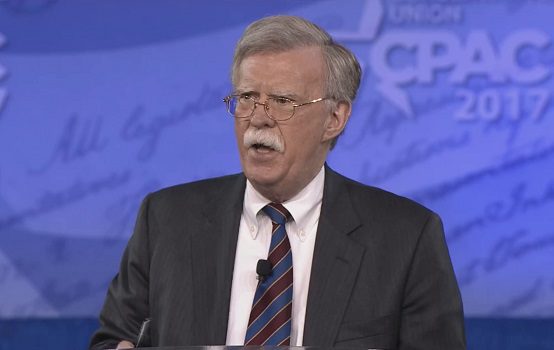Why John Bolton Isn’t Part of the Trump Administration

John Bolton, the most hawkish of Washington’s hawks, strutted onto the stage Friday at the Conservative Political Action Conference and presented what can only be described as a Boltonian view of the world: America’s influence around the world is declining; its exceptionalism is being neutered by a shadowy group of global elites. By the end of the ten-minute speech, you might have gotten a hint as to why the Trump administration passed on hiring the former ambassador to the United Nations for jobs in the White House and State Department.
Bolton’s lambasting of global aristocrats aside, there isn’t much in the man’s worldview that rings consonant with President Trump’s “America First” foreign policy. Throughout the campaign, Trump made a compelling argument that struck a chord with America’s blue-collar and middle classes: the U.S. has been spending the past 15 years on a wild-goose chase in the Middle East, spending trillions of taxpayer dollars in order to overthrow and undermine governments we don’t like and using hundreds of thousands of American soldiers to reconstruct broken societies. Where Barack Obama referred to Iraq as the “dumb war” that distracted the U.S. military from the “good war” in Afghanistan, Donald Trump went several big steps further, labeling the Iraq adventure a disaster that tore the region apart. The invasion “may have been the worst decision anybody has made, any president has made in the history of this country,” Trump told CNN’s Anderson Cooper at a February 2016 town hall.
You know who doesn’t think the invasion of Iraq was a terrible blunder? John Bolton. Indeed, a full ten years after U.S. troops drove Saddam Hussein into a spider-hole and disbanded the Iraqi army—a decade in which much of Washington admitted that the management and assumptions powering the invasion and occupation were beyond hubristic—Bolton told the Washington Examiner that the decision was the right one. “I still think the decision to overthrow Saddam was correct,” Bolton said. “I think decisions made after that decision were wrong, although I think the worst decision made after that was the 2011 decision to withdraw U.S. and coalition forces.” With beliefs like that, is it any wonder why Bolton was passed over for three national-security jobs in the administration?
Donald Trump is receiving incoming from all directions for the comments he’s made, some of the executive orders he’s signed, and the tweets he’s posted, but Americans can breathe easy knowing he didn’t hire Bolton as secretary of state, deputy secretary of state, or national-security advisor. Trump likely would have seen his vision of a more restrained America overseas thrown out and replaced by the neoconservative, reflexively interventionist positions that he campaigned against so ferociously.
[youtube https://www.youtube.com/watch?v=S5i41PkMQYo]
We can only imagine how policies would change if Bolton were given authority. The Iran deal? Bolton has blasted the accord as appeasement (one of his favorite words) of a radical Islamist regime that wants to wipe the West off the face of the earth; it would likely be ripped apart and replaced with the very economic sanctions that created the need for the deal in the first place. The fact that the International Atomic Energy Agency has verified on multiple occasions that Tehran is following its commitments wouldn’t matter to Bolton, because the Iranians are inherently mischievous and the IAEA is part of the exclusive club of global bureaucrats who put their faith in multilateral cooperation.
What about North Korea, a hated regime for sure but one that the U.S. has always tried to contain rather than destroy? During his CPAC address, Bolton said that the only way to solve the North Korean problem for good is to change the government in Pyongyang and reunite the Korean Peninsula under Seoul’s leadership. While he may ultimately be correct on this point, the cost in American blood and treasure to achieve that goal doesn’t seem to be of particular concern to the former diplomat. Bolton may think that China can and should take care of the problem for us, but anticipating such an action would be a fantastical illusion; for a man who professes to know the world, Bolton fails to grasp that Beijing, like Washington, has a set of core interests that it aims to protect. Removing Kim Jong-un and thereby destabilizing a nuclear North Korea, with all of the refugees that would pour across the North Korea-China border as a result, definitely isn’t one of them.
Donald Trump is president, so he has the privilege to take counsel from anyone he would like. Bolton’s appearance at CPAC was a reaffirmation of why he was not chosen.
Daniel DePetris is a fellow at Defense Priorities. The views in this piece are his alone.
Comments